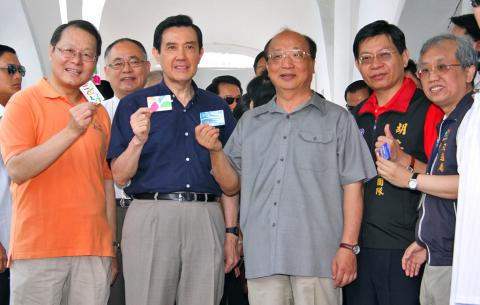Giving Greater Taichung Mayor Jason Hu (胡志強) a thumbs-up for planning the central city’s new Bus Rapid Transit (BRT) blue line that he said is as good as a subway, President Ma Ying-jeou (馬英九) yesterday also lauded Hu’s governance as better than that of Taipei Mayor Hau Lung-bin (郝龍斌).
Ma made the remarks after a 3.5km ride on the Bus Rapid Transit route along Taiwan Boulevard on the eve of the opening of its year-long free service.
Ma, who is also Chinese Nationalist Party (KMT) chairman, said that every time he visits Greater Taichung, the city gives him a different impression, as it is gradually transforming into an international metropolis.

Photo: CNA
He touted the effort Hu has put into the regeneration of Maple Park, describing it as an example of “turning trash into treasure.”
Saying the bus system offers a great view along its route, Ma said he thinks the public transportation system is better than Taipei’s MRT metropolitan rail system, which is mostly underground.
Ma said he thinks the acronym “BRT” should stand for “Bravo Remarkable Taichung,” expressing hopes that there will be good follow-up work that can make the system in Taichung a model for public transport development in other cities.
Hu, a KMT member running for re-election in the Nov. 29 elections, was smiling ear to ear in response to Ma’s praise.
The 17.2km-long blue line connects Taichung’s railway station and Providence University in the western part of the city. It is one of six BRT lines that are expected to be completed one after another, with the final line opening in 2019.
The system consists of articulated buses — whose sections are connected by a pivoting point — that can carry up to 120 passengers and, for the most part, travels in a dedicated bus lane.
For the next year, passengers using electronic travel cards such as an EasyCard or iPass can use the blue line for free.
Ma also touted Hu’s management of government funds, saying he was more capable than Hau at reducing city government deficits.
In response, Hau, a KMT member, later yesterday said through a Taipei City Government spokesperson that he believes city policies should be judged as an integrated whole, adding that he thinks different cities can learn from each other’s strengths and together become better.
Separately, when questioned by reporters, independent Taipei mayoral candidate Ko Wen-je (柯文哲) said Ma made a gaffe in his compliments for Hu.
It seems Ma’s definition of “good governance” is different from that held by the general public, Ko said, likening Hau and Hu’s mayoral stints to a test in which the mayors are like two students who respectively scored 38 and 40 percent — both failing the test.
KMT Taipei mayoral candidate Sean Lien (連勝文), on the other hand, said that he thinks Hu is good at marketing Taichung and that Hau is decisive in implementing Taipei City’s policies.
“I have much to learn from them both,” Lien said.
Additional reporting by Chiu Shao-wen and Wu Liang-yi

The Ministry of Foreign Affairs (MOFA) yesterday said it is closely monitoring developments in Venezuela, and would continue to cooperate with democratic allies and work together for regional and global security, stability, and prosperity. The remarks came after the US on Saturday launched a series of airstrikes in Venezuela and kidnapped Venezuelan President Nicolas Maduro, who was later flown to New York along with his wife. The pair face US charges related to drug trafficking and alleged cooperation with gangs designated as terrorist organizations. Maduro has denied the allegations. The ministry said that it is closely monitoring the political and economic situation

UNRELENTING: China attempted cyberattacks on Taiwan’s critical infrastructure 2.63 million times per day last year, up from 1.23 million in 2023, the NSB said China’s cyberarmy has long engaged in cyberattacks against Taiwan’s critical infrastructure, employing diverse and evolving tactics, the National Security Bureau (NSB) said yesterday, adding that cyberattacks on critical energy infrastructure last year increased 10-fold compared with the previous year. The NSB yesterday released a report titled Analysis on China’s Cyber Threats to Taiwan’s Critical Infrastructure in 2025, outlining the number of cyberattacks, major tactics and hacker groups. Taiwan’s national intelligence community identified a large number of cybersecurity incidents last year, the bureau said in a statement. China’s cyberarmy last year launched an average of 2.63 million intrusion attempts per day targeting Taiwan’s critical

‘SLICING METHOD’: In the event of a blockade, the China Coast Guard would intercept Taiwanese ships while its navy would seek to deter foreign intervention China’s military drills around Taiwan this week signaled potential strategies to cut the nation off from energy supplies and foreign military assistance, a US think tank report said. The Chinese People’s Liberation Army (PLA) conducted what it called “Justice Mission 2025” exercises from Monday to Tuesday in five maritime zones and airspace around Taiwan, calling them a warning to “Taiwanese independence” forces. In a report released on Wednesday, the Institute for the Study of War said the exercises effectively simulated blocking shipping routes to major port cities, including Kaohsiung, Keelung and Hualien. Taiwan would be highly vulnerable under such a blockade, because it

Conflict with Taiwan could leave China with “massive economic disruption, catastrophic military losses, significant social unrest, and devastating sanctions,” a US think tank said in a report released on Monday. The German Marshall Fund released a report titled If China Attacks Taiwan: The Consequences for China of “Minor Conflict” and “Major War” Scenarios. The report details the “massive” economic, military, social and international costs to China in the event of a minor conflict or major war with Taiwan, estimating that the Chinese People’s Liberation Army (PLA) could sustain losses of more than half of its active-duty ground forces, including 100,000 troops. Understanding Chinese